Overview
- Description
- Typewritten lists of participants in training camps (kibbutzim hachsharot) operated in various locations in Poland by Agudat Israel during the 1930s.
- Date
-
creation:
1934
- Credit Line
- United States Holocaust Memorial Museum Collection, The Abraham and Ruth Goldfarb Family Acquisition Fund
Physical Details
- Extent
-
1 folder
Rights & Restrictions
- Conditions on Access
- There are no known restrictions on access to this material.
- Conditions on Use
- Material(s) in this collection may be protected by copyright and/or related rights. You do not require further permission from the Museum to use this material. The user is solely responsible for making a determination as to if and how the material may be used.
Keywords & Subjects
- Topical Term
- Kibbutzim--Poland. Agudat Israel. Jews--Poland.
Administrative Notes
- Holder of Originals
-
United States Holocaust Memorial Museum
- Legal Status
- Permanent Collection
- Provenance
- Acquired, December 2011.
- Funding Note
- The acquisition of this collection was made possible by The Abraham and Ruth Goldfarb Family Acquisition Fund.
- Record last modified:
- 2024-04-01 11:41:26
- This page:
- https://collections.ushmm.org/search/catalog/irn45902
Download & Licensing
In-Person Research
- Available for Research
- Plan a Research Visit
-
Request in Shapell Center Reading Room
Bowie, MD
Contact Us
Also in Mandate Palestine collection
The collection consists of a poster and several archival collections relating to the Jewish experience before, during, and after the Holocaust in the British Mandate in Palestine.
Date: 1934-approximately 1949
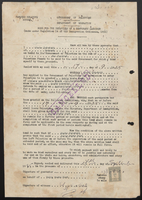
Applications for permission to immigrate to Palestine.
Document
Application documents and correspondence, pertaining to requests to allow Jewish settlers from Lithuania to immigrate to Palestine and work as agricultural workers.
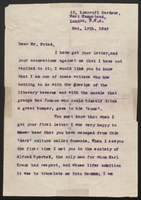
Itzik Manger letter, 1943, October 13
Document
Typescript letter, written by Manger to a Mr. Fried, in London, 13 October 1943. Discusses the fate of the writer Alfred Sperber, the future of the Yiddish language, and the Holocaust.
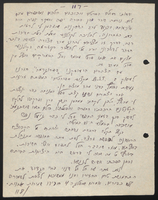
Herzl Mazia diary
Document
The diary, written from July to November 1943, recounts the experiences of a Jewish Brigade soldier, from deployment in Palestine to battles in Tobruk, Benghazi, and elsewhere in North Africa.
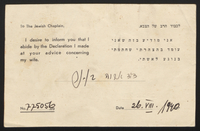
Soldier's get document
Document
One postcard, pre-printed and with signature of a Jewish soldier, declaring that in the event of his death, his wife would not be bound to remain married to him. Addressed to Rabbi Yeshayahu Refaelowitz, Tel-Aviv, 1940.
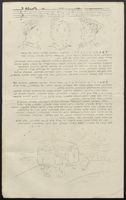
Documents, First Camouflage Company (Palestine), Royal Engineers
Document
Memoranda, certificates, mimeographed song texts, newsletters, collected by unidentified Jewish Brigade soldier, who served with the 1st Camouflage Company (Palestine), Royal Engineers.
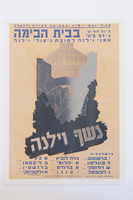
Poster for a performance by Habimah in support of Holocaust survivors
Object
Event poster illustrated by destroyed buildings issued by the Association for Aid and Rescue of Jews from Vilna, Poland (now Vilnius, Lithuania) and the vicinity. It announces an event for Holocaust survivors by Habimah, an internationally acclaimed Hebrew repertory theater company founded in Moscow in 1918, with training and support from Stanislavski. Members of the troupe hoped to create a Jewish renaissance by reviving the Hebrew language. Habimah left the Soviet Union in 1926, and toured throughout the world until splitting in 1927. Some members settled in Palestine and Habimah was reestablished in Tel Aviv in the 1930s, eventually becoming Israel's National Theater. Among the participants at this event were Yehoshua Bertonov (1879-1971), and Shmuel Rodensky (1904-1989), both natives of Lithuania and members of Habimah in Russia.



